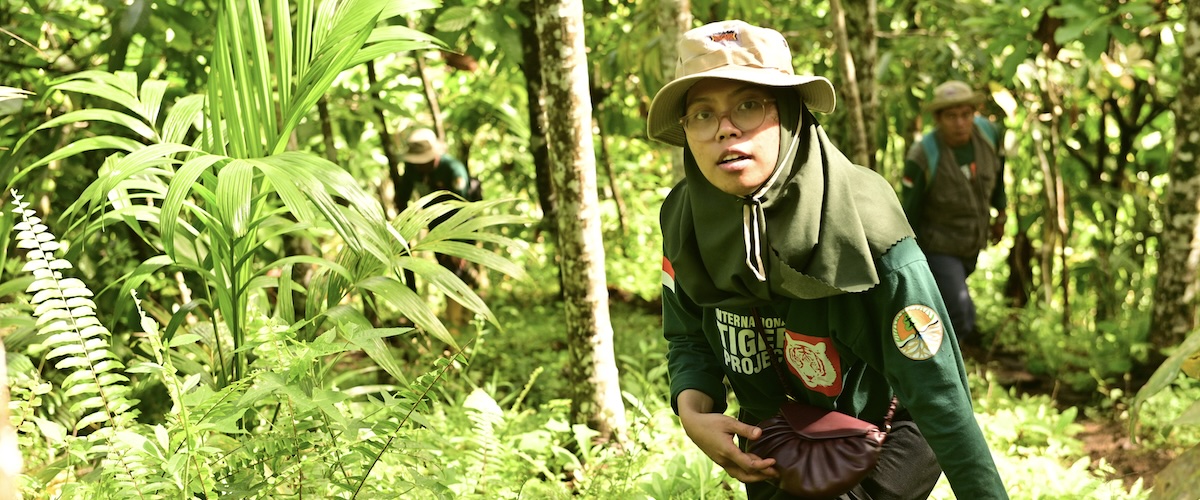We interviewed Masters student Putri Utami Saryanti Caesaris who volunteered for one month with our APE Protector (Tiger) team in West Sumatra.

Putri Utami Saryanti Caesaris is one of many young, passionate Indonesians dedicated to making a difference in conservation. Currently pursuing her Masters in Ecology, Evolution, and Conservation at Potsdam University in Germany, Putri recently took a hands-on approach to her studies by volunteering with the APE Protector (Tiger) team in West Sumatra for a month.
We had the pleasure of interviewing Putri to learn more about her experiences and insights from the field.
Can you tell us a bit about yourself and what inspired you to volunteer with the APE Protector team?
As Indonesia is my homeland, I am eager to engage more deeply with its natural environment and see for myself how conservation works in one of the world's biodiversity hotspots. The APE Protector team in Pasaman not only conducts fieldwork but also organises school visits as part of their education program. I find this approach effective for fostering social engagement, particularly among younger generations, to raise awareness about Sumatran tiger conservation. Additionally, the forests surrounding Pasaman serve as a natural habitat for many important species. It is truly fascinating to work and learn about conservation in this area.
What was a typical day like for you as part of the tiger patrol team?
Every day was varied, allowing me to experience many different aspects of the work. During the first two weeks, I was busy visiting schools and assisting the team in preparing for a new excursions program. In another week, I had the opportunity to join the mitigation team to address a conflict in one of the districts in the Pasaman region. I also participated in a patrol of one of the protected forests in Pasaman.
Can you describe a memorable moment you had in the forest, whether it was spotting signs of tigers or something unexpected?
While patrolling the forest, we discovered numerous signs of wild boar, as well as their nests. It was fascinating to encounter these, as I had never seen them before. I also didn't realise that we would need to ride a motorcycle to enter the forest. The steep landscape and the slippery soil from the rain the night before made it quite a challenge, even as a passenger, to stay calm on the road. During the conflict mitigation efforts, I also spotted tiger tracks and watched the team set up a camera trap, which I found really cool.
What were some of the biggest challenges you faced during the patrols?
To keep up with others. It was not easy to match the speed with the others while I was still getting used to the tracks. Also, the steep and slippery tracks made it even harder to follow the team. But fortunately the team was very helpful and understanding.
Why do you think it’s important for young Indonesians, especially women, to be involved in wildlife conservation efforts like tiger patrols?
As flora and fauna continue to decline, and we depend on them for our survival, it is especially important for younger generations to be aware of the natural resources we have. Moreover, Indonesia is blessed with an incredible biodiversity, making it vital for us to learn more about our natural resources so that we can foster a symbiotic relationship rather than exploit them.
What do you believe are the biggest threats to wildlife, especially tigers, in Pasaman Raya, and how can people in Indonesia help protect them?
From what I've seen, land use change, wildlife exploitation and litter are the biggest threats to wildlife. It is very saddening to see so much litter in the conservation area.
How has this experience changed you personally, and what are your plans for the future in conservation or other fields?
I believe my experience volunteering in Pasaman has motivated me even more to continue learning in order to help preserve our natural resources. I also learned that we don’t need complicated or fancy materials to raise awareness about wildlife conservation; we just need to be present and motivated. As for my future plans, I aim to finish my studies and, hopefully, have the opportunity to work in the conservation field.
